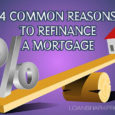
When you try to find the best loan value for refinancing your mortgage, reliability of the lender is a major factor. So you will probably want to begin your research with lenders, that you are already familiar with: banks, savings and loans, credit unions and insurance companies. You may be able to save money in the loan process and/or be offered better terms based on your total assets on deposit or good customer history.
Mortgage rates and fees are usually published in the real estate sections of metropolitan newspapers. In addition to the newspaper, you may want to use popular search engines on the Internet to locate mortgage lenders and current interest rates.
Because there are so many variables, you’ll need a systematic approach. The following eight topics will help you ask lenders questions about the terms of the mortgages they offer.
Compare Fixed-Rate Mortgages:
- Company name/phone number/loan officer’s name:
- Mortgage type and terms:
Mortgage type:
Mortgage terms (15, 20, 30 years, etc.) - Interest rates and points:
Interest rate quoted on __/__/20__ is:
Number of points:
Can points be financed?
Annual percentage rate (APR): - Interest rate lock-ins:
Upon application? At approval?
Lock-in costs? Effective how long?
Lower lock-in rates drop? - Minimum amount of equity in home required:
Without mortgage insurance? With mortgage insurance?
Is mortgage insurance required? Up-front costs?
Monthly premiums? Can it be financed? - Prepayment of principal:
Is there a prepayment penalty on current mortgage loan?
If yes, percentage of outstanding principal:
Will there be a penalty on the new loan?
Duration of penalty? Extra principal payments allowed? - Loan processing time
How many days estimated from:
Application to approval?
Approval to closing? - Closing costs/fees:
Application fee
Loan origination fee
Credit report fee
Appraisal fee
Title search/title insurance (Is reissue rate available?)
Survey fee
Lender’s attorney fee
Transfer taxes
Any other closing costs quoted (such as tax service fees, recordation fees, document preparation fees, courier and notary fees)?
Does lender offer no-cost/no-point refinancing?
Will lender waive any closing costs or fees?
Item Explanation of Fixed-rate Comparison Terms:
- Company name/phone number/loan officer’s name: Write down the name of the loan officer with whom you speak, so you can get back in touch if you decide to apply for a refinanced mortgage.
- Mortgage type and terms: When comparing mortgages among lenders, compare the same loan among all the lenders you call-in other words don’t compare rates on a 30-year fixed rate with one lender to a 15-year fixed rate from another. When comparing adjustable rate mortgages be sure each lender ties their rate of performance to the same index. There are three major indexes and these are described under the subject of Understanding Adjustable Rate Mortgages.
- Interest rate and points: Interest rates change often, even daily. Make sure you record the date of your rate quote. Try to call all lenders on the same day, so you have an accurate comparison.
To obtain the lowest rate offered by the lender, most lenders will charge several points, and the total cost can run between 3 and 6% of the total amount you borrow. So, for example, on a $100,000 mortgage, the lender might charge you between $3,000 and $6,000. However, some lenders may offer zero points at a higher interest rate, which may significantly reduce your initial costs, although your payments may be somewhat higher.
Shopping for points as well as interest rates may save you money. As a rule of thumb, each point adds about one-eighth to one-quarter of 1% to the interest rate the lender is offering.
Generally, the lower the interest rate on the loan, the more points the lending institution will charge. Some lenders offer refinancing with no points, but generally charge higher interest rates.
To decide what combination of rate and points is best for you, balance the amount you can pay up front with the amount you can pay monthly. The less time that you keep the loan, the more expensive points become. If you plan to stay in your house for a long time, then it may be worthwhile to pay additional points to obtain a lower interest rate.
Some lenders may offer to finance the points so that you do not have to pay them up front. This means that the points will be added to your loan balance, and you will pay a finance charge on them. Although this may enable you to get the financing, it also will increase the amount of your monthly payments.
One method to compare loans with different points is to use the Annual Percentage Rate (APR), which lenders must disclose to borrowers under federal law. The figure includes points and other closing costs and spreads them over the life of the loan. While the APR provides you with a common point for comparison, it’s important to look at all features before deciding with mortgage to get. Also, be sure to ask the lenders you contact if points can be financed.
- Interest rate lock-ins: When a lender agrees to hold the quoted rate for you, this is called a “lock-in.” Ask when can the rate be locked-in at the time of application or only upon approval? Will the lender lock in both the interest rate and points? Can you get a written lock-in agreement? How long does the lock-in remain in effect? Is there a charge for locking-in a rate? If the rate drops before closing, must you close at your locked-in rate or can you get the lower rate?If you decide to apply for refinancing with a particular lender, and if you do not want to let the interest rate “float” until closing, get a written statement guaranteeing the interest rate and the number of discount points that you will pay at closing. This binding commitment or “lock-in” ensures that the lender will not raise these costs even if rates increase before you settle on the new loan. You also may consider requesting an agreement where the interest rate can decrease but not increase before closing. If you cannot get the lender to put this information in writing, you may wish to choose one who will.
Most lenders place a limit on the length of time (say, 60 days) they will guarantee the interest rate. You must sign the loan during that time or lose the benefit of that particular rate. Because many people are refinancing their mortgages, there may be a delay in processing the papers. Therefore, you may want to contact your loan officer periodically to check on the progress of your loan approval and to see if additional information is needed.
- Minimum equity in home required: Ask the loan officer about the lowest allowable amount of equity you need in your home to refinance with and without private mortgage insurance.
Private mortgage insurance (MI) is insurance that protects lenders from foreclosure losses on low down payment loans.
As a result, private MI helps families buy homes with minimal cash out of pocket, making the American dream of homeownership attainable sooner than otherwise possible. If private mortgage insurance (MI) is required, ask how much it will cost. Find out how much is due up-front at closing and the amount included as monthly premiums. Ask if you can finance the closing cost of MI. Also ask how long MI will be required. In some cases, you may be able to cancel the MI when your loan balance drops below 80% of the appraised value of the property relied upon to originate the refinanced loan, or when a new appraisal establishes that your mortgage is 80% less of the new appraised value. When your loan value is scheduled to drop below 78%, MI is automatically canceled if your loan payments are current.
- Prepayment of principal: Some lenders charge borrowers a prepayment penalty if they pay off the loan early. You first should find out if there is a prepayment penalty on your current mortgage loan; if there is a penalty, find out how much you will have to pay if you refinance your loan. Next, if you think you may sell your home before the loan is paid off (most mortgages are repaid early) or plan to make principal payments before they are actually due, you need to know if there will be a penalty on the refinanced loan and how long it will remain in effect. Some penalties are in effect only for the early years of the loan.
- Loan processing time: Loan approvals used to take 30 days or more, but lenders that use automated underwriting systems often can provide loan approvals within minutes. Peak business periods, particularly when rates are dropping and many homeowners are refinancing, can affect a lender’s response time. Ask each lending institution for its estimate, and see which can promise very short approval and closing times.
- Closing costs/fees: Closing costs are fees required by the lender at closing and can vary considerably from one financial institution to another. Ask specifically about the application fee, loan origination fee, points, credit report fee, appraisal fee, survey fee (if required), lender’s attorney fee, cost of title insurance, transfer taxes, recordation fee, tax service fee and document preparation fee. Be sure to ask each lender you contact if they offer no-cost/no-point refinancing or if they are willing to waive any of the closing costs or fees.




